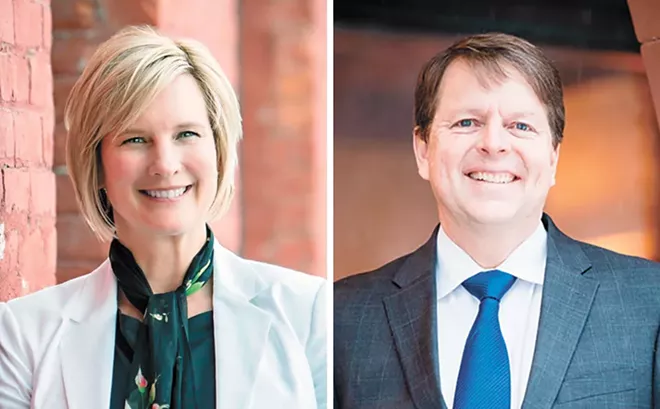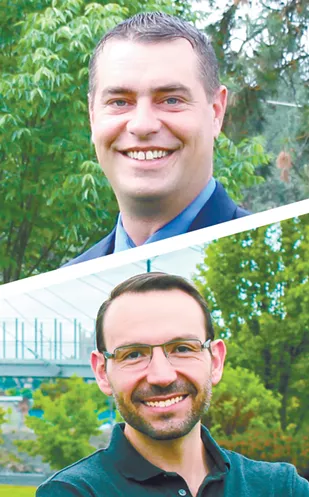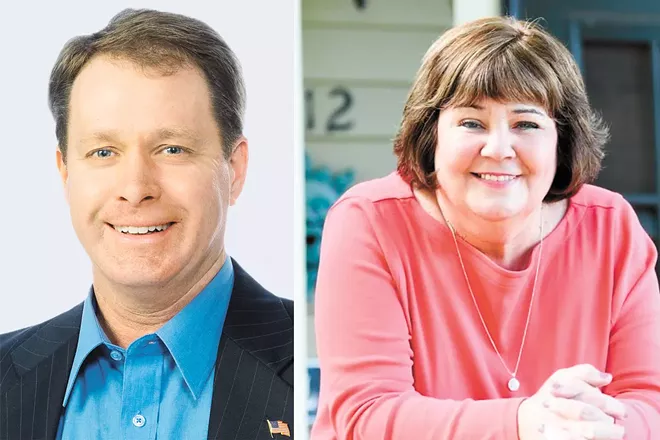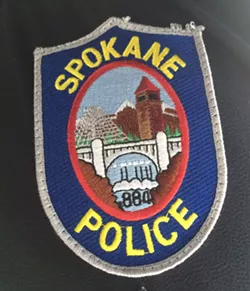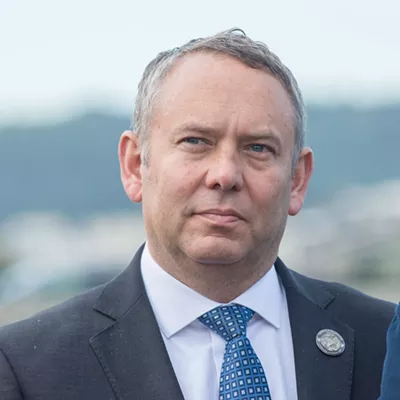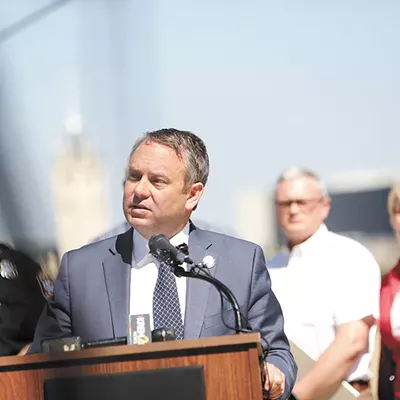SPOKANE CITY COUNCIL PRESIDENT
"Some lawyers are gunslinger lawyers, and other lawyers put things back together," City Councilman BREEAN BEGGS told the Inlander last year. "I can do both. I've done both."
And so as Beggs runs for council president, he's counting on his reputation for forging compromise between disparate parties — whether between the mayor and the City Council, between developers and neighborhoods or between environmental activists and Avista Utilities.
But his opponent, Northtown Square real estate asset manager CINDY WENDLE, argues that the city's struggle to accomplish major priorities — like finalizing a new police contract or establishing a new homeless shelter — is proof of Beggs' ineffectiveness.
"If he was truly someone who wanted to work with people, then solutions would have happened by now," Wendle says.
Yet Beggs argues that Wendle is just highlighting her lack of experience. The council actually gets in trouble, Beggs says, if it tries to interfere too much with the police negotiations.
Wendle hammers Beggs on his left-wing ideology, while Beggs points to Wendle's gauzy answers and lack of detailed solutions.
On homelessness, Wendle argues that repeat violators of sit-lie laws — which prohibit people from sitting on downtown sidewalks during the day — need to face a choice: treatment or jail. But Beggs argues that new shelters and a reformed jail system are legally and ethically necessary before cracking down. (DANIEL WALTERS)
SPOKANE CITY COUNCIL
District 1: With long-term Spokane city Councilman Mike Fagan stepping down, two conservative candidates are jockeying to fill his seat: MICHAEL CATHCART, director of the pro-business organization Better Spokane, and TIM BENN, a northeast Spokane community activist and chair of the Minnehaha Neighborhood Council.
Ideologically, the two candidates are largely in sync. Neither is a fan of raising taxes to pay for services and they both want to increase the number of police officers patrolling city streets. The differences they emphasize are about style rather than substance. Both also want to crack down on drug use in public.
Cathcart, who was previously a legislative aide in the state Senate and a lobbyist for the Spokane Home Builders Association, argues that he has the experience, temperament and existing political relationships to pass policy that can benefit the district. He also criticizes Benn, who has run for office numerous times and co-hosts a conservative talk radio show, as unfit for office.
"It's one thing to go on the radio and scream and yell about issues that you hate. It's another to build relationships to actually advance those policies to get them across the finish line," Cathcart says.
Benn, meanwhile, frames Cathcart as beholden to special interests and out of touch with the district, citing heavy donations from organizations like the Spokane Association of Realtors.
"He might have friends in Olympia, he might have powerful business groups that he knows, but when it comes to representing the people, I know the people," Benn says. "He's going to work for the people who got him into office." (JOSH KELETY)
District 2: LORI KINNEAR has a background in journalism and public relations. She was a legislative assistant for former Councilwoman Amber Waldref before Kinnear won her City Council seat — representing the South Hill and downtown — in 2015. Kinnear, who drove the effort to make Browne's Addition a designated historic district, says she wants to continue focusing on neighborhoods in her next term.
TONY KIEPE is a former health care consultant who is running on a platform of improving public safety and taking an uncompromising stance on homelessness, arguing that the city should not build more shelter space.
Kiepe supports the controversial right-wing idea popularized by Rep. Matt Shea (R-Spokane Valley) that Eastern Washington should split into its own state called Liberty. Kinnear, meanwhile, called for Shea's resignation following a Spokesman-Review report that Shea targeted her and two other council members for surveillance.
But that's not the only issue where Kinnear and Kiepe stand in stark contrast. Kiepe argues the city shouldn't spend money on a new shelter or warming centers this winter, arguing that strategy would force people who are homeless to move out of Spokane. Kinnear, meanwhile, calls that not only inhumane, but illegal. And while Kinnear believes in climate change, Kiepe doesn't — even though he has solar panels on his house. (WILSON CRISCIONE)
District 3: In the race to represent Northwest Spokane in District 3, political newcomer ANDY RATHBUN faces incumbent KAREN STRATTON, who first won the seat in 2015.
In her time on council, Stratton says she's proud of working with constituents in neighborhoods like Indian Trail, where she encouraged hundreds of voters to voice their opinions on a new development they opposed, which ultimately led the council not to approve a zone change there.
Rathbun, who retired from the Air Force a year ago, says he's proud of his work in West Central over the last 20 years, serving in various leadership positions on its neighborhood council and on the West Central Community Center board.
As of the time ballots were mailed last week, Rathbun had received a campaign chest of about $75,000, including $30,000 of his own money, and another $30,000 in independent expenditures on his behalf from the Washington Realtors Political Action Committee and the Spokane Home Builders Association PAC.
Stratton, meanwhile, had about $44,000, including $125 of her own money, and about $400 spent in independent expenditures on her behalf by Fuse Votes. (SAMANTHA WOHLFEIL)
SPOKANE PROPOSITIONS
Proposition 1: It's been three years that members of the Spokane Police Guild have worked without a contract. What's the hold up? We don't know. The press isn't allowed to sit in on the meetings.
Proposition 1 would try to change that by mandating that public union NEGOTIATIONS be opened to the public. Better Spokane, the initiative's sponsor, argues that it's all about transparency. In fact, in 2013, the city of Spokane's Use of Force Commission, a citizen committee tasked with recommended police reforms, called for the city "to be as open as legally possible regarding its negotiations with the Spokane Police Guild and the Spokane Police Lieutenants and Captains Association."
Unions, however, have traditionally opposed the measure, arguing that it's harder to negotiate when both sides are trying to show off for their stakeholders.
City Council President Ben Stuckart also opposes the initiative, arguing that — because state labor law generally requires bargaining conditions to be agreed upon by both parties — if the proposition is passed, it will almost certainly expose the city to an expensive lawsuit it would lose. And even if it doesn't, Stuckart says, it's bad practice to unilaterally change bargaining conditions when trying to make a deal in good faith with a bargaining partner. (DANIEL WALTERS)
Proposition 2: After Seattle tried to implement a local INCOME TAX, the business-friendly political action group Better Spokane wanted to be extra sure that Spokane couldn't and subsequently introduced an initiative to ban taxes on "wages, salaries, investments, the sale of goods or services or any other income source."
But City Council President Ben Stuckart notes that Washington's Constitution already makes income taxes illegal, accusing the ordinance of being a solution in search of a problem.
Michael Cathcart, director of Better Spokane who's also running for the City Council, argues that after an appeals court ruled that Seattle had the right to implement a uniform income tax, the question is in doubt. He says passing the resolution is all about making Spokane an attractive place for businesses. He says the proposition would also outlaw local business and occupation taxes.
A business and occupation tax was used to fund Expo '74, the transformational event that created Riverfront Park, Stuckart counters. What if the city wanted to do something like that again?
"My worry is they're also trying to attack things like the utility tax," Stuckart says. And if the law gets interpreted that broadly, he says, it would be devastating to the budget of Spokane. (DANIEL WALTERS)
SPOKANE PUBLIC SCHOOLS BOARD

Position 1: NIKKI LOCKWOOD, an activist and leader of a group called the Every Student Counts Alliance that's fought for discipline reform, and KATEY TRELOAR, a former elementary school teacher, both got involved in Spokane Public Schools as advocates for their children. But they differ on a few key issues. Lockwood opposes any armed officers in schools, while Treloar is open to having some Spokane police officers in schools. Lockwood is in favor of a levy to solve the district's budget crisis, while Treloar calls it a "short-term solution to a much bigger problem."
Position 2: JENNY SLAGLE, who serves on the district's diversity advisory council and who is the director of tribal relations for the nonprofit Better Health Together, says the district can still do more to reduce racial disparities in schools. KELLI MACFARLANE, a former full-time teacher who has been a substitute for Spokane Public Schools for the last two years, questions whether or not there are disparities in the first place. MacFarlane supports arming officers, while Slagle doesn't.
Position 4: The difference between KEVIN MORRISON and ERIN GEORGEN comes down more to their background rather than their policies. Morrison, until 2018, was the spokesman for the district and last year took an interim role as the director of safety and security. And years ago, he managed bond projects for the school district. Georgen is a part-time physical therapist assistant who also runs a graphic design company who says she can bring the perspective of working parents. Both would consider bringing a levy to voters, but Morrison would like to wait a year. Neither are for armed officers in schools, but would like to strengthen the district's relationship with police. (WILSON CRISCIONE)
Initiative 976: Here are the basics: If you live in Spokane, currently you pay annual car tab fees that include the basic tab renewal and licensing fees (ranges from $30 to $93, depending on your vehicle), another $25 to $65 based on the weight of your vehicle, and a $20 Transportation Benefit District (TBD) fee.
For a Subaru Outback from 2002-2004, for example, your annual fees come out to $83.75.
Other counties have higher TBD fees, and in the Puget Sound area, drivers also pay a motor vehicle excise tax that is based on the value of their vehicle.
WASHINGTON STATE MEASURES

Initiative 976: Here are the basics: If you live in Spokane, currently you pay annual car tab fees that include the basic tab renewal and licensing fees (ranges from $30 to $93, depending on your vehicle), another $25 to $65 based on the weight of your vehicle, and a $20 Transportation Benefit District (TBD) fee.
For a Subaru Outback from 2002-2004, for example, your annual fees come out to $83.75.
Other counties have higher TBD fees, and in the Puget Sound area, drivers also pay a motor vehicle excise tax that is based on the value of their vehicle.
Initiative 976 would drop the basic TAB and LICENSING FEES down to $30 for all vehicles under 10,000 pounds, from snowmobiles to commercial trailers to trucks and cars, unless a change is approved by local voters. It would remove the vehicle weight fee and get rid of TBD fees entirely.
The initiative also drops a $150 annual fee levied on electric vehicles to $30, though a new $75 annual fee that started in August would remain in place. The vehicle value used to calculate excise taxes like those in Puget Sound would be reduced and based on Kelley Blue Book values.
If approved, the measure is expected to reduce revenue for state transportation projects by $1.9 billion over the next six years, and funding for local transportation projects by $2.3 billion in the next six years.
I-976 was sponsored by Tim Eyman, a political activist and professional initiative sponsor who made headlines earlier this year for stealing a $70 office chair from Office Depot. (He later returned it and settled his case, which remains off his record if he doesn't steal again this year.)
Proponents like Eyman say that places like the Puget Sound have been hit with overburdensome fees for projects like Sound Transit's light rail system, and the measure would make costs for residents more reasonable.
Eyman says the current vehicle values used for the excise tax are too high. "Taxing a $10,000 vehicle like it's $25,000 is fraud," he writes in a guest column widely shared by media outlets around the state.
Opponents say major state projects such as the North-South Freeway in Spokane would be in jeopardy without the money collected under the current fees, not to mention the impact on local projects.
In Spokane, the measure would mean an immediate loss of about $3 million per year that comes from the Transportation Benefit District fee, which pays for about half of the city's efforts to repave and chipseal residential roads, explains city spokeswoman Marlene Feist. The measure could also endanger other city projects that rely on matching state and federal funds. (SAMANTHA WOHLFEIL)
Referendum 88: This is the chance for voters to decide whether they want AFFIRMATIVE ACTION. Gov. Jay Inslee last year signed a measure bringing back affirmative action — which allows public colleges and other entities to consider race as one factor in admissions — earlier this year. The law is intended to help women and minorities have more opportunities for better education, income and employment, but opponents argue that people should be rewarded based on their merit instead. A "yes" vote approves the measure that Inslee signed, and a "no" vote rejects affirmative action.

